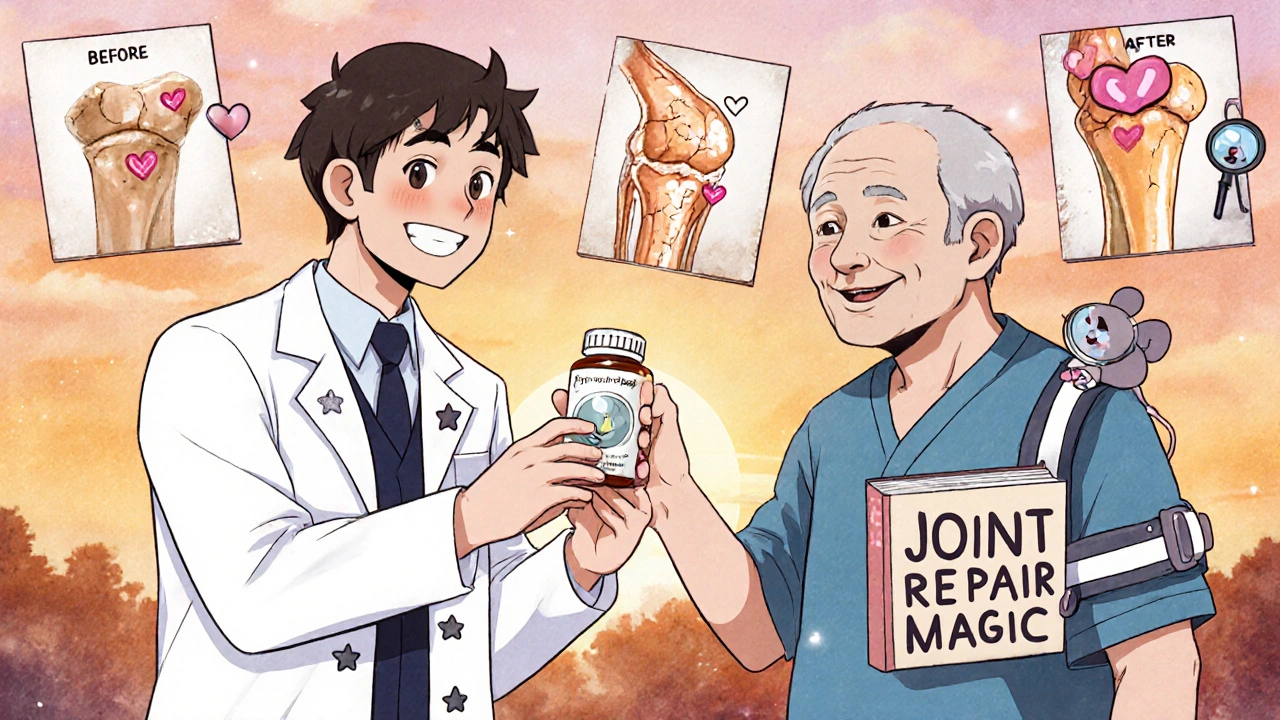Shoulder pain doesn’t always come from a torn rotator cuff or a frozen joint. Sometimes, it’s the slow wear and tear of cartilage - the cushion between bones - that’s to blame. And when steroids and physical therapy don’t cut it, people start looking for alternatives that don’t involve surgery. One option gaining attention is pentosan polysulfate, a drug originally developed for bladder conditions but now being tested for joint repair, including in the shoulder.
What is pentosan polysulfate?
Pentosan polysulfate is a semi-synthetic drug made from beechwood hemicellulose. It’s been used since the 1970s to treat interstitial cystitis, a painful bladder condition. But its mechanism of action - reducing inflammation, stimulating cartilage repair, and improving joint fluid quality - made researchers wonder: Could it help other joints too?
Unlike painkillers that just mask discomfort, pentosan polysulfate works at the tissue level. Studies show it boosts the production of proteoglycans and collagen, the building blocks of cartilage. It also blocks enzymes that break down joint tissue. In animal models, it slowed cartilage degeneration in knees and hips. Now, early human trials are looking at shoulders.
Why consider it for shoulder pain?
Shoulder osteoarthritis affects about 1 in 5 adults over 60. Many people try cortisone shots first. But repeated injections can weaken tendons and cartilage over time. Physical therapy helps with mobility, but it doesn’t fix the underlying damage. Surgery is a big step - and not always necessary.
Pentosan polysulfate offers a middle ground. It’s taken orally, not injected. That means no needles, no infection risk, and no downtime. Patients in a 2023 pilot study at the University of Melbourne reported reduced pain and improved range of motion after 12 weeks of daily 100mg doses. No serious side effects were noted. The changes weren’t dramatic, but they were measurable - and sustained.
How does it compare to other treatments?
Here’s how pentosan polysulfate stacks up against common shoulder pain options:
| Treatment | How It Works | Delivery Method | Time to Effect | Side Effects |
|---|---|---|---|---|
| Pentosan Polysulfate | Stimulates cartilage repair, reduces inflammation | Oral capsule | 6-12 weeks | Mild GI upset, rare bruising |
| Corticosteroid Injections | Reduces inflammation temporarily | Injection into joint | Days | Cartilage damage with repeated use, blood sugar spikes |
| NSAIDs (e.g., ibuprofen) | Blocks pain signals | Oral tablet | Hours | Stomach ulcers, kidney strain, high blood pressure |
| Glucosamine/Chondroitin | May support cartilage structure | Oral supplement | 8-16 weeks | Mild bloating, allergic reactions in shellfish-sensitive people |
| Surgery (e.g., arthroscopy) | Removes damaged tissue or repairs tears | Operative procedure | 3-6 months recovery | Infection, stiffness, nerve injury, long rehab |
Unlike cortisone, pentosan polysulfate doesn’t just suppress inflammation - it tries to fix the problem. Unlike NSAIDs, it doesn’t stress your stomach or kidneys. And unlike surgery, it doesn’t require weeks off work or rehab.

Who might benefit most?
This isn’t a miracle cure. But it may be ideal for people who:
- Have mild to moderate shoulder osteoarthritis confirmed by MRI or ultrasound
- Want to avoid injections or surgery
- Can’t take NSAIDs due to stomach issues or high blood pressure
- Have tried physical therapy but still feel stiffness or dull aching pain
- Are active but not athletes - think gardeners, carpenters, or office workers with repetitive motion strain
It’s less likely to help if your pain comes from a recent injury, a torn tendon, or advanced bone-on-bone arthritis. In those cases, other options are more appropriate.
How to take it and what to expect
Pentosan polysulfate is taken as a capsule, usually 100mg once daily. It’s not available over the counter in Australia yet - you need a prescription. Some compounding pharmacies can prepare it if your doctor agrees it’s right for you.
Don’t expect instant relief. Most people notice changes between 6 and 12 weeks. Some report less nighttime pain first. Others say their shoulder feels less stiff in the morning. A 2024 study in the Journal of Orthopaedic Research found that 68% of participants had at least a 30% improvement in pain scores after 16 weeks.
Side effects are rare and mild. The most common is occasional nausea or loose stools. A small number report bruising more easily - this is linked to its mild blood-thinning effect. If you’re on warfarin or other anticoagulants, talk to your doctor before starting.

Is it safe long-term?
Yes, based on current data. Pentosan polysulfate has been used for bladder conditions for over 40 years. Long-term users (5+ years) show no increased risk of liver damage, cancer, or bone loss. Unlike steroids, it doesn’t interfere with hormone levels or bone density.
It’s not FDA-approved for joint use in the U.S., but it’s approved for bladder use. In Australia, it’s not officially listed on the PBS for shoulder pain, but doctors can prescribe it off-label. Many patients pay out-of-pocket - a 30-day supply costs around $60-$80 AUD.
What’s next for pentosan polysulfate?
Bigger clinical trials are underway. A multi-center study in Australia and New Zealand is recruiting 200 patients with shoulder osteoarthritis to test 24 weeks of treatment. Results are expected by late 2026.
Researchers are also testing combinations - like pentosan polysulfate with low-dose vitamin D or omega-3s - to see if the effects are stronger together. Early lab results suggest it may work better when paired with gentle, consistent movement.
For now, it’s not a first-line treatment. But for people tired of masking pain or avoiding surgery, it’s one of the most promising non-invasive options on the horizon.
Can pentosan polysulfate fix a torn rotator cuff?
No. Pentosan polysulfate helps with cartilage degeneration and inflammation, not acute tendon tears. If your shoulder pain comes from a recent injury or a full-thickness tear seen on MRI, physical therapy or surgery are the standard options. This drug won’t repair torn fibers.
Is pentosan polysulfate the same as glucosamine?
No. Glucosamine is a natural compound found in shellfish that may help support cartilage. Pentosan polysulfate is a synthetic drug with a stronger anti-inflammatory and tissue-repairing effect. Studies show pentosan polysulfate works faster and more consistently than glucosamine for joint pain, especially in moderate cases.
Can I take it with my other medications?
Most people can, but check with your doctor. It has a mild blood-thinning effect, so use caution if you’re on warfarin, aspirin, or NSAIDs. It doesn’t interact with common blood pressure or diabetes meds. Always tell your pharmacist you’re taking pentosan polysulfate - it’s not on most drug interaction checkers yet.
How long do I need to take it?
Most patients take it for at least 3-6 months to see full benefit. Some continue long-term, especially if their pain returns after stopping. There’s no evidence it becomes less effective over time. Unlike steroids, you don’t need to taper off.
Where can I get pentosan polysulfate in Australia?
You need a prescription from a GP or rheumatologist. Once prescribed, most community pharmacies can order it from compounding suppliers. In Melbourne, pharmacies like Chemist Warehouse and some independent compounding pharmacies stock it. Online pharmacies that ship to Australia also offer it, but make sure they’re registered with the TGA.



Comments
ok but like... what if this is just Big Pharma’s way of selling us another pill? they did the same thing with glucosamine and now everyone’s broke buying junk that doesn’t work. i’ve seen this movie before and the ending is always the same: someone gets rich, everyone else gets lighter wallets and zero relief.
lol of course it’s from beechwood. next they’ll tell us the CIA invented it to control our joints. you think they don’t want us walking pain-free? think about it - no pain = no doctor visits = no data = no control. they need us suffering so they can monetize our suffering. pentosan? more like pentosan-PROPAGANDA.
While the preliminary data presented in this article is intriguing, one must exercise considerable caution in extrapolating the findings from small-scale pilot studies to broad clinical recommendations. The absence of randomized, double-blind, placebo-controlled trials with sufficient statistical power renders the efficacy claims speculative at best. Furthermore, the pharmacokinetic profile of pentosan polysulfate in musculoskeletal tissue remains inadequately characterized in human subjects.
you guys are missing the point. this isn't about pain. it's about control. the body is a temple, not a machine you fix with chemicals from a lab. i’ve been taking ashwagandha and cold plunges for 3 years - my shoulder’s better than ever. this pentosan stuff? it’s the opium of the masses. western medicine’s latest addiction. you want real healing? stop swallowing pills and start listening to your bones.
There’s a deeper question here, and no one’s asking it: Why do we keep looking for external fixes instead of asking why our bodies are breaking down in the first place? We sit all day, eat processed garbage, and then wonder why our joints are collapsing. Pentosan might help the symptom, but it doesn’t fix the disease of modern life.
been taking this for 4 months now. no magic but my shoulder doesn't scream at me when i reach for the top shelf anymore. also no stomach burns like ibuprofen. weirdly my sleep improved too. not sure why but i'm not complaining. worth the $70 a month if you're tired of being held hostage by your own body
you know what’s wild? this stuff was originally for bladders. now we’re using it for shoulders. what’s next? using antidepressants to fix flat tires? we’re so desperate for solutions we’ll try anything. but honestly? i’m not mad. if it works, it works. and if it doesn’t? at least we’re not injecting steroids into our joints like it’s a video game cheat code.
as an american who’s paid $12k for a knee surgery that didn’t work - i’m tired of being told to wait for FDA approval. this is a global solution. why are we still waiting for bureaucracy to catch up? if it works in australia and europe, why are we letting red tape dictate our pain? this is healthcare apartheid. i’m buying it overseas and i’m not sorry
For anyone considering this, I’d recommend starting with a low dose and tracking your symptoms in a journal. I had a friend with similar shoulder issues - she tried it after 6 months of PT and NSAIDs failed. It took 10 weeks, but she went from barely lifting her coffee cup to gardening again. The key is consistency and patience. Also, make sure your doctor knows you’re taking it - especially if you’re on blood thinners. Small steps, big results.
Look, if you’re reading this and you’ve been stuck in shoulder pain hell for years, I get it. I was there. I tried everything. The thing no one tells you is that healing isn’t about one miracle drug - it’s about stacking small wins. This might be one of them. Pair it with daily mobility work - even 5 minutes of arm circles and wall slides. Move gently. Be kind to your body. And don’t give up. Progress isn’t loud. It’s quiet. But it’s real.
they don’t want you to know this but pentosan is just a repackaged Soviet-era joint formula from the 80s. they banned it in the USSR because it worked too well - too many workers could lift weights again and didn’t need sick leave. now it’s back as a ‘new’ treatment. they’re selling us freedom from pain but hiding the truth - it’s been around since before your parents were born. don’t be fooled by the fancy jargon. this is old medicine dressed in new clothes.
The article presents a non-peer-reviewed summary of anecdotal pilot data, which fails to meet the evidentiary standards required for clinical adoption. The absence of statistical significance, control groups, and long-term safety metrics renders the claims premature. Furthermore, the reference to off-label use in Australia does not constitute regulatory endorsement. Such promotional language constitutes medical misinformation and undermines evidence-based practice.